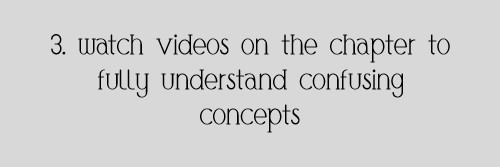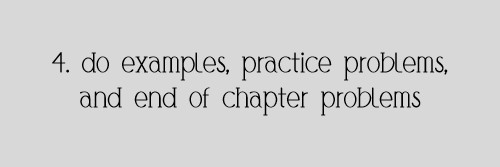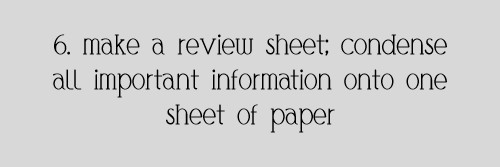Thecaffiend - Thecaffiend
More Posts from Thecaffiend and Others

A Mourning dove gets cozy, and settles in, to experience the sunset.








This hit me right in the feels 🥲

hey guys! for those of you who may not know me, I am Alexi (@alexistudies) and the long awaited masterpost is FINALLY here on how I study for Organic Chemistry (which i might have to retake lmaooo but that’s a story for a different time). Now, I don’t get the best grades, as my professor’s exams are ridiculously hard, but I have learned the material enough to teach others. If you’re struggling with how to navigate this mind-boggling course that’s pretty much like learning a new language, this post is for YOU! lets gettin it crackin’

Always start by reading the material BUT don’t go in with a cold read (aka just reading the chapter from start to finish) break it into 2 steps: SQ3R and then fully read.
SQ3R: Survey, Question, Read, Recite, Review
disclaimer: personally i do this method by chapter section so I am not overwhelmed with material!
survey: skim the material. read the titles of the sections and subsections, and glance over the actual material within the chapter. take mental note of weird acronyms you may see or vocabulary that stands out. this will prime your brain for all the information you’re going to get when you go the 3R’s.
question: get some sticky notes and write down questions for each section in the textbook. for example, if you just skimmed the section on “Sn1 Reactions”, write a question down on the sticky note like “what does Sn1 mean? what does its mechanism look like?” and stick it in the corresponding place. even if the section seems direct and you don’t have any questions, create one regardless. This will help the information stick! Don’t worry about answering them just yet.
read: pretty self explanatory but read a section of the textbook. read it twice if things still seem fuzzy after the first read, and this time, go slower. now, there should be a sticky note where you wrote a question during the second part of this process. write the answer in to the question based on your knowledge from your reading. also, feel free to take note of any other things that seem to stand out on this sticky note. again, i do this section by section in my textbook so i don’t get burned out or overwhelmed.
recite: once you’ve done the first three steps for the whole chapter, its time to collect all the sticky notes!!! set them down on a flat surface in their chronological order and get prepared with your notebook/tablet and stylus/etc. now you’ll compile all your sticky notes into reading notes! during this stage, read your sticky notes out loud and supplement your reading notes by copying & annotating examples from the textbook.

At this point, you should have already read and done most of the first step. Now, its time to go back through and really engage with the material. As you skim each section, you’ll answer the questions you wrote on the sticky notes! This is pretty self explanatory, I hope. This will make sure that you engage with the material and not just blankly read it. I’m a person who gets bored with textbook reading fairly quickly, this really helps me. Its okay if you don’t fully understand the concepts during this step because you’re just putting your feet in the water.

Still confused on the material? Have some small concepts you just can’t seem to get yet? Its okay! Now, you’ll get auditory/visual exposure which will probably help. I watch The Organic Chemistry Tutor’s videos whenever I feel stuck and I take notes as I watch the video to ensure I’m really paying attention.

This step is to really see how much you know. Start with examples from the book, as the solutions are usually right there and they will walk you through. Then, move on to practice problems. In my textbook, they have exercises that follow right after most examples to practice that same concept. Once you’ve gone through as many of these as you deem fit, you should do the end of chapter problems! These problems tend to be a little more comprehensive and build on things from previous chapters, while also being more conceptual.

pls do your homework. it will reinforce everything. i’ve realized that the homework is not necessarily what will be covered on the exam, but it’s like … drills to see if you know the basics. but, this really depends on the professor and what they assign as homework! for me, the homework doesn’t even begin to compare to the complexity of the exams. highlight anything you get stuck on and once you’re done, go back and redo those problems + review that section in your notes and textbook!

Review sheets are a life saver because once exams come around, you have one piece of paper you can study from and you don’t have to carry around all your notes! for ochem specifically, i recommend making a reaction sheet that’s a flow-chart (i.e., if i have these reagents, its going to be a hydroboration reaction). this was something i was hoping to do before my final, but i just burned out and never got to it :(( so i need to practice what i preach either when i retake ochem1 or when i move on to ochem2.
bonus tip!
Ask yourself the following questions when you study.
can you name things? (types of reactions, molecules using IUPAC nomenclature, etc)
can you identify things? (stereochemical relationships between molecules, concepts used in a reaction like markovnikov addition, etc)
can you develop things? (desired products for a reaction, etc)
can you interconvert between things? (from wedge dash > newman projection, chair conformation > newman projection, skeletal structure > fischer projection, reaction > energy coordinate diagram)
Hopefully this helps! I enjoyed making this post because I do enjoy organic chemistry, I just really need to do better in the class next semester and better implement these study techniques (and maybe find new ones that work better)!!
So as a continuation of this post I made in frustration about how anglo-centric most “must-read” book lists are, I went and found a few lists with a focus on non-English speaking authors (sorted by number of books listed):
8 Must-Read Foreign Books Translated Into English (Babbel)
The non-western books that every student should read (The Guardian)
10 best translated fiction (Independent - has suggestions regarding editions + prices)
49 Incredible Books From 49 Different Countries (Huffpost - has amazon links to all the books, which is great to find the editions but please please please support your local bookstores!!!!)
100 Must-Read Classics in Translation (BookRead - Amazon links again. Most bookstores will offer to order books for you if they don’t have them, please utilise their services and support local shops whenever possible!)
All these lists have reviews and feature books from a wide range of countries. I haven’t read every single review but I browsed the lists to make sure they wouldn’t all just name the same books and they don’t!!
I hope you’ll find inspiring new reads on those lists! :)

I realized why the idea of constellations has always swayed me. constellations are so very human.
our wonder of the stars is bone-sunk; we’ve been thinking and dreaming and watching and watching and watching since the beginning of time, and we looked for so long that we started making connections.
we played a celestial game of connect-the-dots; trying to find order in something so vast and trying to show that the stars are in everything and everything is in the stars.
we plucked pictures out of the infinite; there’s a dog, there’s a bear, there’s a lion, see? look, right there; the stars hold and mirror back everything.
but then it went a step further. instead of everyday things, we stopped picking out the cups and the bears, and instead we saw stories.
look, there’s Andromeda, chained to a rock and waiting to be devoured by Cetus. there’s Orion, and Hercules, and do you see Orpheus’ lyre? Zeus sent an eagle to retrieve it after Orpheus’ death and he placed it in the sky.
we did the most human thing imaginable: we wrote our stories into the stars. we filled the night sky; previously so vast, so unknowable; with our history. we forged connections to the stars and made it so our children will always know where they come from.

most people make it seem harder than it is. imagine.
like there’s this whole thing in this book about how your brain grows stronger and healthier by practicing responding to stress in healthy ways,
because if a stressor is predictable and you feel a sense of control over it, you habituate and stop reacting to it,
but if it’s random and unpredictable you have the opposite response and become sensitized, so your reaction actually gets more and more extreme.
(if you hear a loud noise at predictable intervals you’ll soon stop noticing or reacting, but if you hear it at random intervals you’ll become sensitive to it and anxious.)
so one way to help people who have adverse reactions to reminders of trauma is to give them control over how they’re reminded of the trauma,
because it helps the brain practice responding to stress in a safe way so you can habituate to the stress response.
which is why if someone tags something for a trigger and you still choose to look,
it’s actually an act of healthy resistance against your reaction to that trigger (because it teaches your brain to habituate),
but encountering something triggering in a random and unpredictable way actually increases your stress response and makes you more sensitive to the trigger.
so people who are against trigger warnings because “you have to learn to cope” are actually taking away your tools for learning to cope,
because encountering stressors in a way that further strips you of control over your trauma is never, ever helpful.
it’s a lot of stuff i kind of knew but integrated and explained with more context and science
-
 loptoustome reblogged this · 1 week ago
loptoustome reblogged this · 1 week ago -
 heardbook reblogged this · 1 week ago
heardbook reblogged this · 1 week ago -
 elieslittlecreations liked this · 1 week ago
elieslittlecreations liked this · 1 week ago -
 skykaykay reblogged this · 1 week ago
skykaykay reblogged this · 1 week ago -
 msbellebelle reblogged this · 1 week ago
msbellebelle reblogged this · 1 week ago -
 bored-procastinator reblogged this · 1 week ago
bored-procastinator reblogged this · 1 week ago -
 miss-tomoe liked this · 1 week ago
miss-tomoe liked this · 1 week ago -
 fiachdubh reblogged this · 1 week ago
fiachdubh reblogged this · 1 week ago -
 anotherwordforrecluse liked this · 1 week ago
anotherwordforrecluse liked this · 1 week ago -
 skypig357 liked this · 1 week ago
skypig357 liked this · 1 week ago -
 straydogsco reblogged this · 1 week ago
straydogsco reblogged this · 1 week ago -
 nerdylibertarian928 liked this · 1 week ago
nerdylibertarian928 liked this · 1 week ago -
 t0mies-b0dy reblogged this · 1 week ago
t0mies-b0dy reblogged this · 1 week ago -
 meticuloushavoc reblogged this · 1 week ago
meticuloushavoc reblogged this · 1 week ago -
 mycobimbology reblogged this · 1 week ago
mycobimbology reblogged this · 1 week ago -
 mycobimbology liked this · 1 week ago
mycobimbology liked this · 1 week ago -
 dankest-of-lies liked this · 1 week ago
dankest-of-lies liked this · 1 week ago -
 one-girly-geek reblogged this · 1 week ago
one-girly-geek reblogged this · 1 week ago -
 lordotong liked this · 1 week ago
lordotong liked this · 1 week ago -
 thesilverhunt3r reblogged this · 1 week ago
thesilverhunt3r reblogged this · 1 week ago -
 channelsurfer02 liked this · 1 week ago
channelsurfer02 liked this · 1 week ago -
 channelsurfer02 reblogged this · 1 week ago
channelsurfer02 reblogged this · 1 week ago -
 stupid-fat-panda reblogged this · 1 week ago
stupid-fat-panda reblogged this · 1 week ago -
 nutzgunray-lvt liked this · 1 week ago
nutzgunray-lvt liked this · 1 week ago -
 pastelstoic liked this · 1 week ago
pastelstoic liked this · 1 week ago -
 sparksnyper reblogged this · 1 week ago
sparksnyper reblogged this · 1 week ago -
 askmarietheapprentice reblogged this · 1 week ago
askmarietheapprentice reblogged this · 1 week ago -
 giganotus liked this · 1 week ago
giganotus liked this · 1 week ago -
 nightbringer24 liked this · 1 week ago
nightbringer24 liked this · 1 week ago -
 takashi0 reblogged this · 1 week ago
takashi0 reblogged this · 1 week ago -
 magodangretsus reblogged this · 1 week ago
magodangretsus reblogged this · 1 week ago -
 nightwingisnotperfect liked this · 1 week ago
nightwingisnotperfect liked this · 1 week ago -
 peachyyokai liked this · 1 week ago
peachyyokai liked this · 1 week ago -
 fahrennheit liked this · 1 week ago
fahrennheit liked this · 1 week ago -
 liontheliam reblogged this · 1 week ago
liontheliam reblogged this · 1 week ago -
 ascen-dance liked this · 1 week ago
ascen-dance liked this · 1 week ago -
 aubreyplzbemydaddy liked this · 1 week ago
aubreyplzbemydaddy liked this · 1 week ago -
 kermittingacrime reblogged this · 1 week ago
kermittingacrime reblogged this · 1 week ago -
 kelly-clickspring liked this · 1 week ago
kelly-clickspring liked this · 1 week ago -
 eldritchforesthorror liked this · 2 weeks ago
eldritchforesthorror liked this · 2 weeks ago -
 g0respunkz liked this · 2 weeks ago
g0respunkz liked this · 2 weeks ago -
 therealbrigeedarocks reblogged this · 2 weeks ago
therealbrigeedarocks reblogged this · 2 weeks ago -
 perverted-pizza liked this · 2 weeks ago
perverted-pizza liked this · 2 weeks ago -
 blueberry2cheesecake liked this · 2 weeks ago
blueberry2cheesecake liked this · 2 weeks ago -
 somedudewithopinions liked this · 2 weeks ago
somedudewithopinions liked this · 2 weeks ago -
 thisbloghasnoactualpurpose reblogged this · 2 weeks ago
thisbloghasnoactualpurpose reblogged this · 2 weeks ago -
 lsandump reblogged this · 2 weeks ago
lsandump reblogged this · 2 weeks ago -
 liimlsan reblogged this · 2 weeks ago
liimlsan reblogged this · 2 weeks ago -
 snowflake4275 reblogged this · 2 weeks ago
snowflake4275 reblogged this · 2 weeks ago -
 eggtithing reblogged this · 2 weeks ago
eggtithing reblogged this · 2 weeks ago